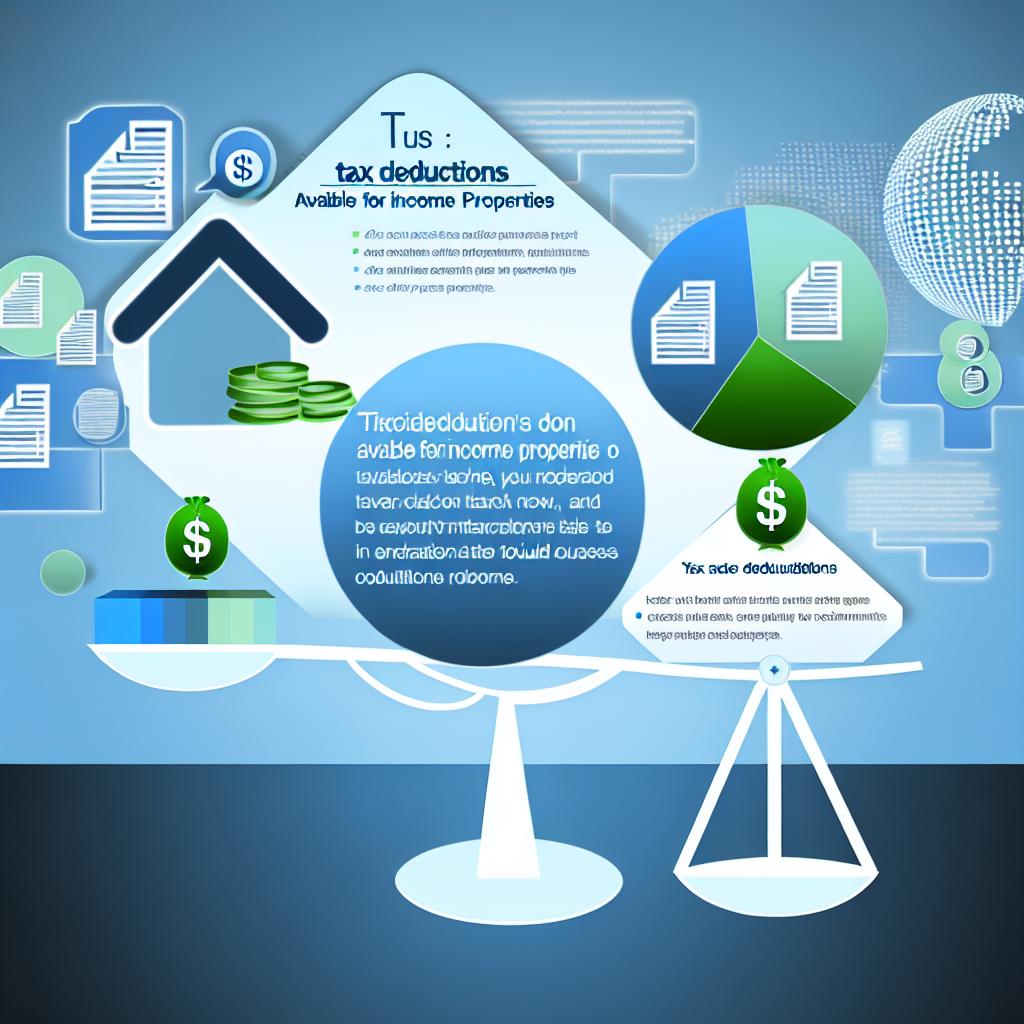Tax deductions available for income properties

Understanding Tax Deductions for Income Properties
Owning an income property can be a rewarding and financially savvy investment strategy. Besides generating rental income, property investors can benefit substantially from a range of tax deductions that effectively enhance their profitability. Through this detailed exploration, gain insights into the potential tax deductions available for income properties, and understand how property owners can optimize their returns.
Mortgage Interest
Mortgage interest significantly influences the deductible expenses available to income property owners. As one of the largest deductions, it enables owners to lower their taxable income considerably by deducting the interest paid on the property’s mortgage. Keeping detailed records of interest payments throughout the year is crucial to maximize this deduction efficiently.
When managing multiple properties, it’s essential to meticulously record and separate the interest applicable to each. This strategy ensures precision in filing and protects against potential complications during audits.
Depreciation
Depreciation is a critical factor in the realm of property ownership, representing a tax advantage that extends across the lifespan of the investment. Remarkably, while an income property’s market value may appreciate over time, the IRS allows owners to deduct depreciation annually, reflecting the “wear and tear” on the property. For residential rental properties, this period spans over 27.5 years, whereas, for commercial properties, it extends to 39 years.
Understanding the depreciation process can be complex, necessitating consultation with the IRS guidelines or a professional tax advisor. This specialist advice is vital to accurately compute your allowable depreciation, aligning with compliance requirements.
Property Taxes
Property taxes comprise another significant deductible expense for income property owners. Owners are entitled to deduct the full amount of property taxes paid within any given taxable year, be it on an annual or semi-annual basis. Documentation of these payments is essential, underscoring the importance of record-keeping in claiming accurate deductions.
Awareness and preparation for these annual tax obligations facilitate financial planning, safeguarding resource allocation and supporting the maintenance of optimal cash flow.
Operating Expenses
Operating expenses pertain to ordinary and necessary costs incurred while managing and maintaining an income property. These expenses cover a broad array, including but not limited to:
- Property management fees
- Maintenance and repairs
- Utilities paid by the owner
- Advertising expenses for the rental
It’s critical to distinguish between repairs, which are deductible immediately, and improvements, which must be capitalized and depreciated over time. Making this differentiation ensures compliance and accurate tax filings.
Insurance Premiums
Insurance premiums form an integral part of safeguarding income properties. The premiums paid for comprehensive coverage, such as fire, theft, flood, and liability insurance, are deductible. To substantiate your claims, maintain organized records for insurance policies, including receipts and policy documentation.
This organized record-keeping extends to understanding policy coverage, ensuring appropriate levels of protection and alignment with deductible eligibility.
Travel Expenses
Travel expenses directly related to property management are often overlooked but are indeed deductible. This includes expenditures for trips taken to manage the property, collect rent, or conduct maintenance activities. Deductible travel costs encompass airfare, hotel accommodations, and mileage. Adhering to stringent record-keeping and IRS guidelines is vital to justify these claims.
Approaching mileage claims requires particular attention, carefully recording dates, purposes, and distances traveled to ensure all deductions are legitimate and transparent.
Legal and Professional Fees
Costs associated with professional services, such as legal advice, accounting, or tax preparation fees, directly relating to the income property activities, are deductible. Ensuring that these services pertain specifically to property management or other investment activities is essential for deduction eligibility.
These services provide owners with critical expertise, aiding in compliance, strategic planning, and risk management, thus augmenting the income property’s overall viability.
Managing Your Deductions
Successfully managing deductions remains crucial to harnessing the full financial relief they offer. The importance of meticulous record-keeping cannot be overstated, as it lays the foundation for maximizing benefits and maintaining compliance with tax laws. Enlisting the services of a tax professional or utilizing reliable accounting software further ensures no deductions are overlooked and adherence to IRS regulations is maintained.
By effectively managing deductions and understanding the unique benefits associated with income properties, investors can significantly enhance their financial outcomes. In pursuing further detailed guidance, property owners may consider consulting specific IRS resources or engaging professional services to explore all potential tax advantages.
The calculated application of these deductions can considerably elevate the financial impact of owning income properties, securing greater returns and contributing towards sustained investment success.
